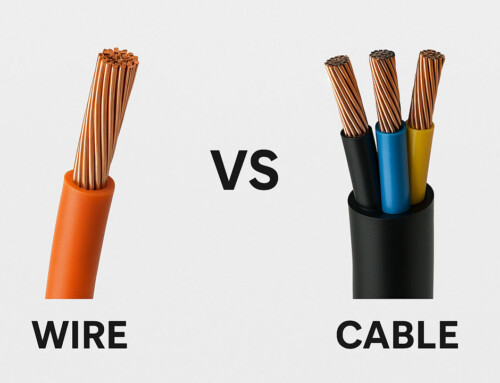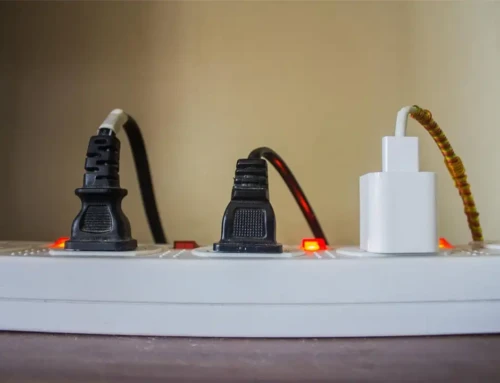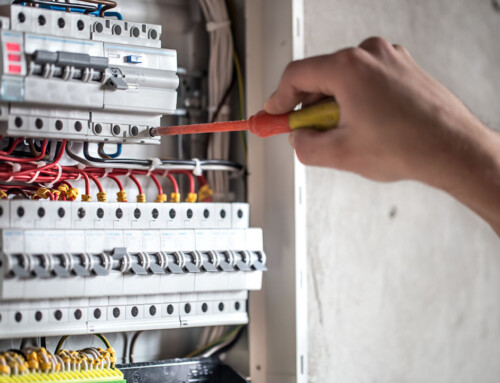Table of Contents
Rewiring your home may not be the first remodeling that comes to mind. Still, it is critical to ensure safety, as ignoring outdated electrical wiring systems can result in catastrophic consequences. According to the Electrical Safety Foundation International (ESFI), around 51,000 fires are caused by residential wiring difficulties each year, resulting in approximately 500 fatalities and $1.3 billion in property damage.
The United States Fire Administration also reported an alarming increase in financial losses due to electrical problems. Given these troubling facts, it is critical to determine whether your home’s wiring is up-to-date and secure.
While the average cost to rewire a house can be on the higher side (up to $30,000, depending on the size of your home), the consequences of ignoring it far outweigh the cost in the long run. It is critical always to prioritize your safety. Let’s get into the details of this important topic!
How Do I Know If House Needs Rewiring?
If you are wondering if your home needs electrical rewiring, there are a few things to look for:-
- Tripping Circuit: First, if your circuit breaker repeatedly trips, it could suggest an overload or a wiring problem.
- Age of the House: Consider the age of your home. Older homes may require renovations to meet current electrical regulations.
- Change of Switches: If you’ve changed outlets or switches but haven’t replaced the wiring, this is a red sign.
- Flickering Lights: Pay attention to any flashing lights. This can indicate underlying electric wiring issues that require addressing.
- Burning Smell: Finally, any burning odours should never be overlooked because they can indicate major problems in your home’s wiring system.
If you discover any of these problems, you should contact a professional electrician for a thorough inspection and repairs.
How Much Does it Cost to Rewire a House?
The cost to rewire a house typically ranges from $1,000 to $30,000, depending on the house’s size, the existing wiring’s condition, and the project’s complexity. Older homes often require more extensive work and thus cost more to rewire; expect to pay around $8 to $10 per square foot on average for a full rewire.
Rewiring your house can be a significant investment, and the cost largely hinges on its size.
- For a small home measuring up to 1,000 sq. ft., you might expect to pay between $1,000 and $2,000.
- If your place falls within the medium range of 1,000 to 2,500 sq. ft., costs may rise accordingly based on additional materials and labor needed for larger spaces.
- Finally, homes exceeding 2,500 sq. ft. can incur even higher expenses as more extensive rewiring becomes necessary.
So whether you are in a cozy bungalow or a sprawling estate, just know that size plays an important role in determining how much you spend on electrical upgrades!
The cost to rewire a house per Square feet:
| Square feet | The Average Cost to Rewire |
| 250 | $1,300 – $4,300 |
| 500 | $2,500 – $8,500 |
| 800 | $4,000 – $13,600 |
| 900 | $4,500 – $15,000 |
| 1,000 | $5,000 – $17,000 |
| 1,200 | $6,000 – $20,400 |
| 1300 | $6500 – $21,500 |
| 1400 | $7000 – $22,500 |
| 1,500 | $7,500 – $25,500 |
| 1600 | $ 8000 – $27,500 |
| 2,000 | $10,000 – $34,000 |
| 2,500 | $12,500 – $42,500 |
| 3,000 | $15,000 – $51,000 |
| 3,500 | $17,500 – $59,500 |
| 4,000 | $20,000 – $68,000 |
The cost to rewire by Room:
| Room Type | Estimated Cost | Details |
| Living Room | $1,500 – $3,000 | Includes rewiring outlets, switches, lighting fixtures, and possibly entertainment systems. |
| Kitchen | $2,000 – $4,500 | Higher cost due to the need for multiple circuits for appliances like ovens and dishwashers. |
| Bathroom | $1,000 – $2,500 | Includes rewiring for lighting, GFCI outlets, and ventilation fans. |
| Bedroom | $1,200 – $2,500 | Covers outlets, switches, and lighting fixtures. |
| Dining Room | $1,500 – $3,000 | This may include special wiring for chandeliers and outlets. |
| Basement | $2,000 – $6,000 | Cost depends on whether the basement is finished or unfinished and includes heavy-duty circuits. |
| Garage | $1,000 – $3,000 | Includes rewiring for lighting, outlets, and possibly EV chargers. |
| Home Office | $1,500 – $3,000 | Accounts for additional outlets, lighting, and possibly data cabling. |
| Entire House | $8,000 – $20,000+ | Varies based on total square footage, labor, and materials. |
What are the Factors That Affect the Price of Rewire Your House?
When considering the cost of rewiring your home, several key factors come into play.
- Home Size: First, the size of your house significantly influences expenses; larger spaces typically require more materials and labor.
- Electric System: The type of electrical system you choose and its components can also affect pricing, as some materials are more costly than others.
- Electrical Panel Update: Additionally, upgrading your electrical panel may add to overall costs if it’s outdated or insufficient for current needs.
- Labor Rates: Keep in mind that the labor cost to rewire a house varies depending on where you live and the complexity of the job involved in making everything safe and up to code.
- Ease of Work: Lastly, accessibility issues within your home—like cramped spaces or hard-to-reach areas—can increase labor time and costs as well.
What are the Additional Costs and Considerations to Rewire Your House?
Remodeling your home might result in unforeseen bills, particularly when it comes to rewiring.
-
Cutting Into Walls
Running new cables frequently necessitates cutting into walls. Once you do, you may discover issues such as decay or mold that must be addressed. Many rewiring jobs may have certain essential variables that affect the overall cost.
If you live in an older home with plaster walls, running new wiring through confined wall spaces is difficult. After the electrician has completed their work, you may need to hire another contractor to open the walls and perform the repairs.
If you live in a normal 1,250-square-foot house, the cost of opening up those walls and rewiring might vary from $7,500 to $15,000. However, larger homes or those with limited access may see prices rise as high as $30,000.
-
Inspection Requirement
Most towns demand inspections for both remodeling and newly installed wiring systems. These inspections are typically included in permit fees ranging from $200 to $900 and take place immediately after your electrician completes the new wiring but before any fixtures are connected.
-
Cleaning Requirement
Another consideration is clean-up: opening those walls makes quite a mess! While debris removal is frequently included in your wall contractor’s price, it’s always a good idea to double-check. Sometimes, local electricians typically do not offer cleanup services because their tiny vans are not suited to take waste away.
-
Upgrade & Improvement
Depending on what has to be improved, upgrading electrical systems can cost anywhere from $526 to more than $2,000. The difference comes down to whether you are making modest alterations, such as servicing modern panels, or significant replacements, which are required when working on older homes with archaic knob-and-tube systems.
How to Rewire a House?
Rewiring a house is a complex and potentially dangerous task that requires careful planning, the right tools, and adherence to electrical codes. If you’re not experienced with electrical work, it’s best to hire a licensed electrician. However, if you’re looking to understand the process, here’s a step-by-step guide:
Step 1: Plan and Get Permits
Before starting, determine your electrical needs, including the number of outlets, switches, and light fixtures required in each room. Creating a detailed wiring diagram will help map out the circuits and ensure a smooth process. Additionally, it is crucial to check local electrical codes and obtain the necessary permits to comply with legal requirements.
Step 2: Turn Off the Power and Prepare the Work Area
Safety is a top priority when dealing with electrical wiring. Begin by shutting off the electricity to the house at the main breaker. Use a voltage tester to confirm that no live wires are present before proceeding. To protect furniture and flooring from dust and debris, remove or cover them appropriately.
Step 3: Remove Old Wiring
Carefully remove all old wiring, including outdated outlets and switches. If the house has knob-and-tube or aluminum wiring, it must be replaced with modern copper wiring for safety and efficiency. Take care not to damage walls excessively during this process, as you may need to patch them later.
Step 4: Install New Electrical Panel and Wiring
If the existing electrical panel is outdated, consider upgrading to a modern Electrical Panel with higher capacity. Run new wiring through walls, ceilings, and floors according to your wiring plan, ensuring each wire is placed correctly. In areas where protection is necessary, use conduits or casing. Label each circuit clearly to make future maintenance easier.
Step 5: Install Outlets, Switches, and Fixtures
Once the wiring is in place, install outlets, switches, and lighting fixtures following standard wiring configurations. Ensure that all connections are properly secured and that grounding wires are correctly attached to prevent electrical hazards. Fasten all electrical boxes securely to the wall studs to keep them stable.
Step 6: Test the Wiring
Before restoring power, double-check all connections for accuracy and safety. Use a circuit tester to detect any faults or loose connections. If local regulations require it, have a licensed electrician inspect the work to ensure compliance with safety standards.
Step 7: Restore Power and Final Testing
Once everything has been inspected, turn on the main breaker to restore power. Test all outlets, lights, and switches to ensure they are functioning correctly. If any issues arise, troubleshoot and fix them before sealing the walls and finishing the project.
What are the Primary Benefits of House Rewire?
Electrical rewiring of your house can bring a multitude of benefits such as:-
- Safety: It significantly enhances safety by reducing the risk of electrical fires or malfunctions.
- Performance: You Might also notice an improvement in electrical performance, ensuring your appliances run efficiently and reliably.
- Property Value: Additionally, upgrading your wiring can increase the overall value of your property, making it more appealing to potential buyers.
- Code Compliance: Staying compliant with current building codes is another advantage that comes with rewiring; this helps avoid legal issues down the line.
- Energy Efficient: Energy efficiency improvements mean lower utility bills for you while contributing positively to environmental sustainability.
Overall, taking on this project could be one of the best decisions for both safety and long-term investment in your home.
Ready to make your home safer? D&F Liquidators has all the electrical supplies you need to Replace Exesting Wiring. Explore our collection today and ensure your home can safely handle your electrical needs.
Frequently Asked Questions (FAQs)
Can I try to rewire my home myself?
Rewiring your home is a complicated and risky endeavor that demands specialist knowledge. Hence, it is strongly advised that a skilled electrician be employed.
How much does it cost to rewire a 2000 sq. ft. house?
Rewiring a 2000-square-foot home typically costs between $10,000 and $34,000.
How long does it take to rewire a house?
The entire procedure usually takes three to ten days.
Can you live in a house while it’s being rewired?
While you may be able to stay at home while the work is done, expect some inconveniences, such as power disruptions. It is advisable to establish living conditions with your electrician ahead of time to ensure maximum comfort throughout the job.
Does rewiring a house increase its value?
Rewiring, once done, can dramatically increase the value of your property by offering an updated electrical system that informs potential purchasers of its safety and dependability.
What is included in a full house rewire?
A thorough rewire involves upgrading all wiring components to current standards while also boosting energy efficiency.
Can you save on energy by rewiring your house?
Certainly, electrical rewiring can result in lower bills in the long run!






